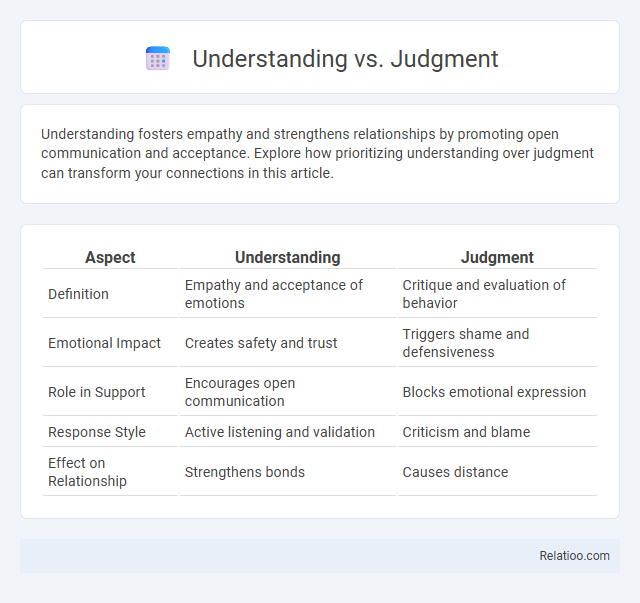Understanding fosters empathy and strengthens relationships by promoting open communication and acceptance. Explore how prioritizing understanding over judgment can transform your connections in this article.
Table of Comparison
| Aspect | Understanding | Judgment |
|---|---|---|
| Definition | Empathy and acceptance of emotions | Critique and evaluation of behavior |
| Emotional Impact | Creates safety and trust | Triggers shame and defensiveness |
| Role in Support | Encourages open communication | Blocks emotional expression |
| Response Style | Active listening and validation | Criticism and blame |
| Effect on Relationship | Strengthens bonds | Causes distance |
Defining Understanding and Judgment
Understanding involves grasping the meaning, intentions, and emotions behind someone's words or actions, enabling deeper empathy and connection. Judgment refers to forming opinions or conclusions about someone's behavior or character, often based on subjective criteria or societal norms. Your ability to distinguish between understanding and judgment fosters more compassionate interactions and reduces misunderstandings.
Key Differences Between Understanding and Judgment
Understanding involves empathetic comprehension of others' feelings and perspectives, allowing for open communication and trust-building. Judgment, by contrast, entails forming opinions or conclusions, often based on personal values or societal norms, which can lead to criticism or evaluation. Your ability to prioritize understanding over judgment fosters deeper connections and promotes emotional warmth in relationships.
The Role of Empathy in Understanding
Empathy plays a crucial role in understanding by allowing you to deeply connect with others' emotions and perspectives, fostering genuine warmth and reducing harsh judgment. This emotional attunement enhances your ability to see beyond surface behavior and appreciate underlying experiences, facilitating more compassionate and effective interactions. Cultivating empathy improves relational dynamics by balancing critical assessment with kindness, promoting trust and open communication.
How Judgment Influences Perception
Judgment significantly shapes your perception by filtering information through personal biases and preconceived notions, often overshadowing objective understanding and warmth. While understanding involves empathy and a genuine grasp of others' perspectives, judgment tends to categorize and label, impacting how you interpret intentions and behaviors. Warmth, reflecting kindness and openness, can mitigate harsh judgment, fostering more balanced and nuanced perceptions.
Psychological Roots of Understanding
Understanding arises from cognitive empathy, allowing individuals to accurately perceive and interpret others' emotions and perspectives, which is deeply rooted in mirror neuron systems and theory of mind processes in the brain. Judgment often stems from automatic cognitive biases and social conditioning, triggering evaluative responses that can hinder genuine connection. Warmth is linked to affective empathy, generating feelings of compassion and kindness that promote social bonding and trust.
The Impact of Judgment on Relationships
Judgment can create barriers in relationships by fostering defensiveness and reducing open communication, impairing emotional connection and trust. Understanding promotes empathy and acceptance, enabling deeper bonds and conflict resolution. Your ability to balance warmth and minimize judgment directly influences the strength and longevity of your relationships.
Benefits of Practicing Understanding
Practicing understanding enhances your ability to empathize, fostering deeper connections and reducing conflicts in personal and professional relationships. This skill improves emotional intelligence, allowing you to respond thoughtfully rather than react impulsively. Developing understanding creates a foundation of trust and respect that supports warmth and constructive judgment.
Overcoming the Urge to Judge
Overcoming the urge to judge requires cultivating understanding and warmth toward others, which builds empathy and reduces biases. Your ability to pause and reflect on the reasons behind someone's behavior shifts the focus from judgment to curiosity and acceptance. Embracing warmth fosters deeper connections and creates an environment where everyone feels valued rather than criticized.
Cultivating a Mindset of Understanding
Cultivating a mindset of understanding involves actively listening and empathizing with others' experiences without immediate judgment, fostering deeper emotional connections. Emphasizing warmth enhances this process by creating a supportive environment where individuals feel valued and heard. Prioritizing understanding over judgment leads to more effective communication and stronger interpersonal relationships.
Real-Life Scenarios: Choosing Understanding Over Judgment
In real-life scenarios, choosing understanding over judgment fosters stronger relationships and promotes empathy by allowing you to see situations from others' perspectives. Warmth, combined with understanding, creates a supportive environment that encourages open communication and mutual respect. Your ability to prioritize understanding helps de-escalate conflicts and build trust in both personal and professional interactions.

Infographic: Understanding vs Judgment
 relatioo.com
relatioo.com